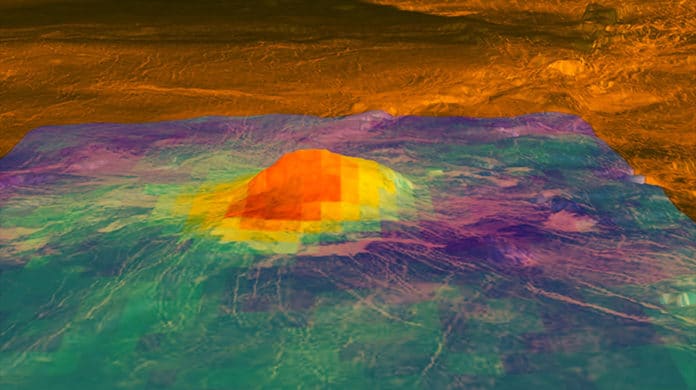In 1990, radar imaging from NASA’s Magellan spacecraft revealed that our neighboring planet-Venus is a world of volcanoes and extensive lava flows. Later on, European Space Agency’s (ESA’s) Venus Express orbiter shed new light on volcanism on Venus by measuring the amount of infrared light emitted from part of Venus’ surface (during its nighttime).
These new data enabled researchers to recognize new versus altered lava flows on the surface of planet. Be that as it may, until recently, the ages of lava eruptions and volcanoes on Venus were not outstanding because the alteration rate of fresh lava was not well constrained.
A new study by the Universities Space Research Association (USRA), has recently shown that lava flows on Venus may be only a few years old, suggesting that planet could be volcanically active today — making it the only planet in our solar system, other than Earth, with recent eruptions.
Dr. Justin Filiberto, the study’s lead author and a Universities Space Research Association (USRA) staff scientist at the Lunar and Planetary Institute (LPI), said, “If it is indeed active today, it will make a great place to visit to understand the interiors of planets better. For example, we could study how planets cool and why the Earth and Venus have active volcanism, but Mars does not. Future missions should be able to see these flows and changes in the surface and provide concrete evidence of its activity.”
For the study, scientists created Venus’ hot caustic atmosphere in the laboratory to investigate how the observed Venusian minerals react and change over time. Their experimental outcomes indicated that a plentiful mineral in basalt — olivine — responds quickly with the atmosphere, and within a few weeks, it gets covered with the iron oxide minerals – magnetite and hematite.
They further found that the Venus Express perceptions of this change in mineralogy would take a couple of years to happen. Hence, the new outcomes by Filiberto and coauthors propose that this lava flows on Venus are exceptionally young, which thus would infer that Venus does indeed have active volcanoes.
The study is published in the journal of Science Advances.
